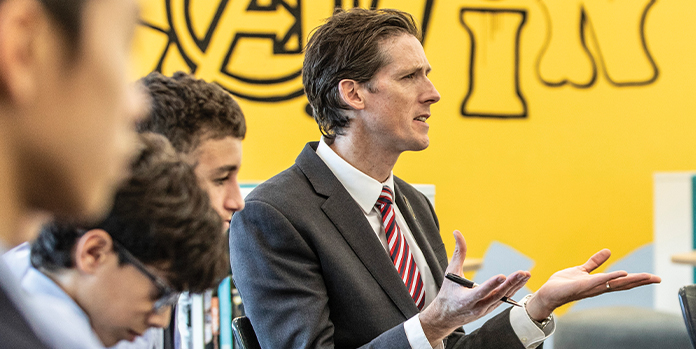Teaching can often be a solitary profession. While collaboration on curriculum and pedagogy does occur, teachers typically work independently in their own classrooms.
For the past three years, Melbourne Grammar School has been encouraging staff to step beyond their own familiar settings and visit others as part of the Cultures of Thinking program led by renowned educator and researcher Ron Ritchhart.
The program aims to provide teachers with new tools and understanding about how to create a culture in their classrooms that can foster deep learning and build understanding.
In addition to observing a wide variety of classes, participants attend tailored workshops presented by Ritchhart and then, over a six-month period, undertake an individual action research project which focus on an area of their choice.
English teacher, John Donaldson, was one of ten Melbourne Grammar staff members who took part in the program last year. Over three days, working in small diverse groups drawn from two other schools, he visited classrooms of different levels and disciplines across Melbourne Grammar, as well as those at co-educational and girls’ only schools.
“I found it to be incredibly helpful to visit classrooms, and to see what the teachers value in terms of learning practices and how that permeates throughout the room”, he says. “Observing, for example, their style of teaching, the language they used, how long they allocated students to question and unpack an idea and even how they organised the furniture in their room was all useful.”
“In addition, the variety of perspectives within my group made our discussions after each visit to the classrooms at the various schools all the more insightful,” he says.
John’s project focused on engagement and empowerment in his classroom. “I wanted to be sure that my students were as interested in learning as I wanted them to be. In addition to undertaking my own academic research, I did further classroom observational visits where I focused on questions like: Is the work meaningful to students? Does it have a purposeful application? How are these students being empowered?”
John then translated his learning into change in his classroom. One shift he made was in his English classroom book discussions.
“I realised that a lot of the themes and topics we were discussing were being dictated by me. I changed the model so that students would come to the lesson with their own prompts to be discussed in a book chat circle. It really empowered them to choose the ideas that they perceived as worthy.”
“I was still able to guide them in terms of critical thinking and questioning and how they articulated their ideas, but the dynamic really shifted in the room. Of course, I don’t use this approach every lesson, but I am really pleased that it has worked so well.”



